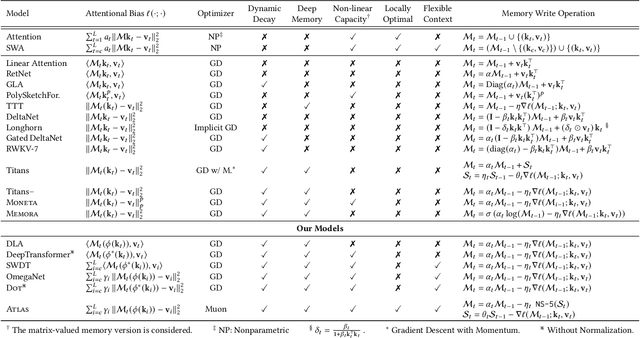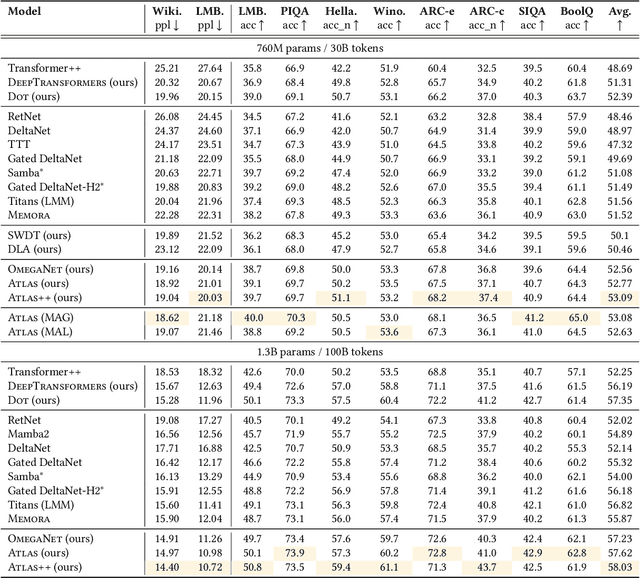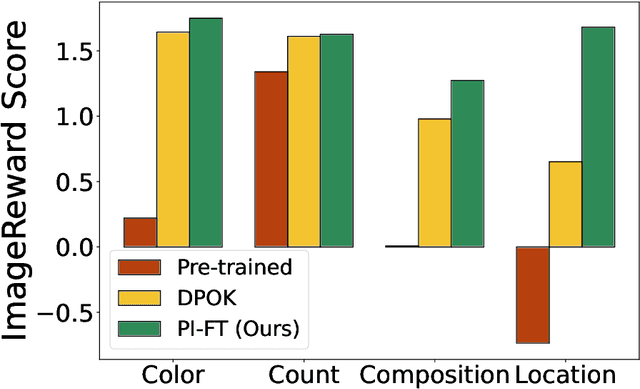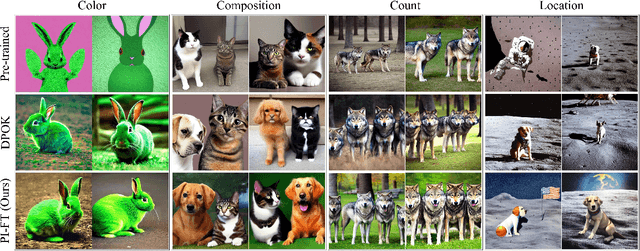Meisam Razaviyayn
Nested Learning: The Illusion of Deep Learning Architectures
Dec 31, 2025Abstract:Despite the recent progresses, particularly in developing Language Models, there are fundamental challenges and unanswered questions about how such models can continually learn/memorize, self-improve, and find effective solutions. In this paper, we present a new learning paradigm, called Nested Learning (NL), that coherently represents a machine learning model with a set of nested, multi-level, and/or parallel optimization problems, each of which with its own context flow. Through the lenses of NL, existing deep learning methods learns from data through compressing their own context flow, and in-context learning naturally emerges in large models. NL suggests a philosophy to design more expressive learning algorithms with more levels, resulting in higher-order in-context learning and potentially unlocking effective continual learning capabilities. We advocate for NL by presenting three core contributions: (1) Expressive Optimizers: We show that known gradient-based optimizers, such as Adam, SGD with Momentum, etc., are in fact associative memory modules that aim to compress the gradients' information (by gradient descent). Building on this insight, we present other more expressive optimizers with deep memory and/or more powerful learning rules; (2) Self-Modifying Learning Module: Taking advantage of NL's insights on learning algorithms, we present a sequence model that learns how to modify itself by learning its own update algorithm; and (3) Continuum Memory System: We present a new formulation for memory system that generalizes the traditional viewpoint of long/short-term memory. Combining our self-modifying sequence model with the continuum memory system, we present a continual learning module, called Hope, showing promising results in language modeling, knowledge incorporation, and few-shot generalization tasks, continual learning, and long-context reasoning tasks.
TNT: Improving Chunkwise Training for Test-Time Memorization
Nov 10, 2025Abstract:Recurrent neural networks (RNNs) with deep test-time memorization modules, such as Titans and TTT, represent a promising, linearly-scaling paradigm distinct from Transformers. While these expressive models do not yet match the peak performance of state-of-the-art Transformers, their potential has been largely untapped due to prohibitively slow training and low hardware utilization. Existing parallelization methods force a fundamental conflict governed by the chunksize hyperparameter: large chunks boost speed but degrade performance, necessitating a fixed, suboptimal compromise. To solve this challenge, we introduce TNT, a novel training paradigm that decouples training efficiency from inference performance through a two-stage process. Stage one is an efficiency-focused pre-training phase utilizing a hierarchical memory. A global module processes large, hardware-friendly chunks for long-range context, while multiple parallel local modules handle fine-grained details. Crucially, by periodically resetting local memory states, we break sequential dependencies to enable massive context parallelization. Stage two is a brief fine-tuning phase where only the local memory modules are adapted to a smaller, high-resolution chunksize, maximizing accuracy with minimal overhead. Evaluated on Titans and TTT models, TNT achieves a substantial acceleration in training speed-up to 17 times faster than the most accurate baseline configuration - while simultaneously improving model accuracy. This improvement removes a critical scalability barrier, establishing a practical foundation for developing expressive RNNs and facilitating future work to close the performance gap with Transformers.
Sampling and Loss Weights in Multi-Domain Training
Nov 10, 2025Abstract:In the training of large deep neural networks, there is a need for vast amounts of training data. To meet this need, data is collected from multiple domains, such as Wikipedia and GitHub. These domains are heterogeneous in both data quality and the diversity of information they provide. This raises the question of how much we should rely on each domain. Several methods have attempted to address this issue by assigning sampling weights to each data domain using heuristics or approximations. As a first step toward a deeper understanding of the role of data mixing, this work revisits the problem by studying two kinds of weights: sampling weights, which control how much each domain contributes in a batch, and loss weights, which scale the loss from each domain during training. Through a rigorous study of linear regression, we show that these two weights play complementary roles. First, they can reduce the variance of gradient estimates in iterative methods such as stochastic gradient descent (SGD). Second, they can improve generalization performance by reducing the generalization gap. We provide both theoretical and empirical support for these claims. We further study the joint dynamics of sampling weights and loss weights, examining how they can be combined to capture both contributions.
Memory-Efficient Differentially Private Training with Gradient Random Projection
Jun 18, 2025Abstract:Differential privacy (DP) protects sensitive data during neural network training, but standard methods like DP-Adam suffer from high memory overhead due to per-sample gradient clipping, limiting scalability. We introduce DP-GRAPE (Gradient RAndom ProjEction), a DP training method that significantly reduces memory usage while maintaining utility on par with first-order DP approaches. Rather than directly applying DP to GaLore, DP-GRAPE introduces three key modifications: (1) gradients are privatized after projection, (2) random Gaussian matrices replace SVD-based subspaces, and (3) projection is applied during backpropagation. These contributions eliminate the need for costly SVD computations, enable substantial memory savings, and lead to improved utility. Despite operating in lower-dimensional subspaces, our theoretical analysis shows that DP-GRAPE achieves a privacy-utility trade-off comparable to DP-SGD. Our extensive empirical experiments show that DP-GRAPE can reduce the memory footprint of DP training without sacrificing accuracy or training time. In particular, DP-GRAPE reduces memory usage by over 63% when pre-training Vision Transformers and over 70% when fine-tuning RoBERTa-Large as compared to DP-Adam, while achieving similar performance. We further demonstrate that DP-GRAPE scales to fine-tuning large models such as OPT with up to 6.7 billion parameters.
ATLAS: Learning to Optimally Memorize the Context at Test Time
May 29, 2025



Abstract:Transformers have been established as the most popular backbones in sequence modeling, mainly due to their effectiveness in in-context retrieval tasks and the ability to learn at scale. Their quadratic memory and time complexity, however, bound their applicability in longer sequences and so has motivated researchers to explore effective alternative architectures such as modern recurrent neural networks (a.k.a long-term recurrent memory module). Despite their recent success in diverse downstream tasks, they struggle in tasks that requires long context understanding and extrapolation to longer sequences. We observe that these shortcomings come from three disjoint aspects in their design: (1) limited memory capacity that is bounded by the architecture of memory and feature mapping of the input; (2) online nature of update, i.e., optimizing the memory only with respect to the last input; and (3) less expressive management of their fixed-size memory. To enhance all these three aspects, we present ATLAS, a long-term memory module with high capacity that learns to memorize the context by optimizing the memory based on the current and past tokens, overcoming the online nature of long-term memory models. Building on this insight, we present a new family of Transformer-like architectures, called DeepTransformers, that are strict generalizations of the original Transformer architecture. Our experimental results on language modeling, common-sense reasoning, recall-intensive, and long-context understanding tasks show that ATLAS surpasses the performance of Transformers and recent linear recurrent models. ATLAS further improves the long context performance of Titans, achieving +80\% accuracy in 10M context length of BABILong benchmark.
It's All Connected: A Journey Through Test-Time Memorization, Attentional Bias, Retention, and Online Optimization
Apr 17, 2025Abstract:Designing efficient and effective architectural backbones has been in the core of research efforts to enhance the capability of foundation models. Inspired by the human cognitive phenomenon of attentional bias-the natural tendency to prioritize certain events or stimuli-we reconceptualize neural architectures, including Transformers, Titans, and modern linear recurrent neural networks as associative memory modules that learn a mapping of keys and values using an internal objective, referred to as attentional bias. Surprisingly, we observed that most existing sequence models leverage either (1) dot-product similarity, or (2) L2 regression objectives as their attentional bias. Going beyond these objectives, we present a set of alternative attentional bias configurations along with their effective approximations to stabilize their training procedure. We then reinterpret forgetting mechanisms in modern deep learning architectures as a form of retention regularization, providing a novel set of forget gates for sequence models. Building upon these insights, we present Miras, a general framework to design deep learning architectures based on four choices of: (i) associative memory architecture, (ii) attentional bias objective, (iii) retention gate, and (iv) memory learning algorithm. We present three novel sequence models-Moneta, Yaad, and Memora-that go beyond the power of existing linear RNNs while maintaining a fast parallelizable training process. Our experiments show different design choices in Miras yield models with varying strengths. For example, certain instances of Miras achieve exceptional performance in special tasks such as language modeling, commonsense reasoning, and recall intensive tasks, even outperforming Transformers and other modern linear recurrent models.
Synthetic Text Generation for Training Large Language Models via Gradient Matching
Feb 24, 2025Abstract:Synthetic data has the potential to improve the performance, training efficiency, and privacy of real training examples. Nevertheless, existing approaches for synthetic text generation are mostly heuristics and cannot generate human-readable text without compromising the privacy of real data or provide performance guarantees for training Large Language Models (LLMs). In this work, we propose the first theoretically rigorous approach for generating synthetic human-readable text that guarantees the convergence and performance of LLMs during fine-tuning on a target task. To do so, we leverage Alternating Direction Method of Multipliers (ADMM) that iteratively optimizes the embeddings of synthetic examples to match the gradient of the target training or validation data, and maps them to a sequence of text tokens with low perplexity. In doing so, the generated synthetic text can guarantee convergence of the model to a close neighborhood of the solution obtained by fine-tuning on real data. Experiments on various classification tasks confirm the effectiveness of our proposed approach.
PiKE: Adaptive Data Mixing for Multi-Task Learning Under Low Gradient Conflicts
Feb 10, 2025Abstract:Modern machine learning models are trained on diverse datasets and tasks to improve generalization. A key challenge in multitask learning is determining the optimal data mixing and sampling strategy across different data sources. Prior research in this multi-task learning setting has primarily focused on mitigating gradient conflicts between tasks. However, we observe that many real-world multitask learning scenarios-such as multilingual training and multi-domain learning in large foundation models-exhibit predominantly positive task interactions with minimal or no gradient conflict. Building on this insight, we introduce PiKE (Positive gradient interaction-based K-task weights Estimator), an adaptive data mixing algorithm that dynamically adjusts task contributions throughout training. PiKE optimizes task sampling to minimize overall loss, effectively leveraging positive gradient interactions with almost no additional computational overhead. We establish theoretical convergence guarantees for PiKE and demonstrate its superiority over static and non-adaptive mixing strategies. Additionally, we extend PiKE to promote fair learning across tasks, ensuring balanced progress and preventing task underrepresentation. Empirical evaluations on large-scale language model pretraining show that PiKE consistently outperforms existing heuristic and static mixing strategies, leading to faster convergence and improved downstream task performance.
Stochastic Control for Fine-tuning Diffusion Models: Optimality, Regularity, and Convergence
Dec 24, 2024



Abstract:Diffusion models have emerged as powerful tools for generative modeling, demonstrating exceptional capability in capturing target data distributions from large datasets. However, fine-tuning these massive models for specific downstream tasks, constraints, and human preferences remains a critical challenge. While recent advances have leveraged reinforcement learning algorithms to tackle this problem, much of the progress has been empirical, with limited theoretical understanding. To bridge this gap, we propose a stochastic control framework for fine-tuning diffusion models. Building on denoising diffusion probabilistic models as the pre-trained reference dynamics, our approach integrates linear dynamics control with Kullback-Leibler regularization. We establish the well-posedness and regularity of the stochastic control problem and develop a policy iteration algorithm (PI-FT) for numerical solution. We show that PI-FT achieves global convergence at a linear rate. Unlike existing work that assumes regularities throughout training, we prove that the control and value sequences generated by the algorithm maintain the regularity. Additionally, we explore extensions of our framework to parametric settings and continuous-time formulations.
A Stochastic Optimization Framework for Private and Fair Learning From Decentralized Data
Nov 12, 2024



Abstract:Machine learning models are often trained on sensitive data (e.g., medical records and race/gender) that is distributed across different "silos" (e.g., hospitals). These federated learning models may then be used to make consequential decisions, such as allocating healthcare resources. Two key challenges emerge in this setting: (i) maintaining the privacy of each person's data, even if other silos or an adversary with access to the central server tries to infer this data; (ii) ensuring that decisions are fair to different demographic groups (e.g., race/gender). In this paper, we develop a novel algorithm for private and fair federated learning (FL). Our algorithm satisfies inter-silo record-level differential privacy (ISRL-DP), a strong notion of private FL requiring that silo i's sent messages satisfy record-level differential privacy for all i. Our framework can be used to promote different fairness notions, including demographic parity and equalized odds. We prove that our algorithm converges under mild smoothness assumptions on the loss function, whereas prior work required strong convexity for convergence. As a byproduct of our analysis, we obtain the first convergence guarantee for ISRL-DP nonconvex-strongly concave min-max FL. Experiments demonstrate the state-of-the-art fairness-accuracy tradeoffs of our algorithm across different privacy levels.
 Add to Chrome
Add to Chrome Add to Firefox
Add to Firefox Add to Edge
Add to Edge